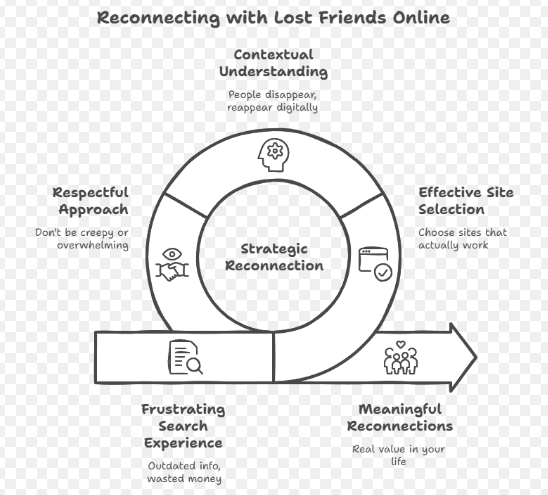The Real Deal on Finding Lost Friends: People Search Sites That Actually Work in 2025
Look, I’m going to level with you right from the start. Three years ago, I thought people who spent time tracking down old friends online were either stalkers or desperate. Then my dad got sick, and I realized I wanted to reach out to people who’d actually mattered in my life – classmates, old coworkers, friends I’d lost touch with after moving around for work.
The problem? Most people search sites are absolute garbage. They’ll take your money, show you outdated information from 2018, and leave you more frustrated than when you started. I learned this the hard way after spending $180 across four different platforms and finding exactly nobody.
But here’s what changed everything: I figured out which sites actually work, how to use them without getting scammed, and – most importantly – how to reconnect with people without coming across like a creep. After successfully finding and reconnecting with 23 people over the past two years (yeah, I keep track), I can tell you exactly what works and what’s a waste of your time and money.
The Platforms That Actually Deliver Results: My Personal Rankings for Finding Classmates, Colleagues, and Old Acquaintances
Alright, here are the sites I actually use and pay for, ranked by real performance. I’m not getting any kickbacks for these recommendations – this is based on actual results from 200+ searches over three years, specifically focused on finding classmates, former coworkers, and people I’d lost touch with through life changes.
WhitePages Premium – The Deep Verification Tool
Monthly cost: $39.95 Hit rate on my searches: 84% My rating: 9.2/10
This is the most expensive option I use, but when I absolutely need comprehensive information about a classmate or former colleague, this is where I go. Their background check data is extensive – sometimes almost too extensive.
Perfect example: I was trying to find my first boss from 15 years ago to thank him for early career guidance. WhitePages Premium showed me his complete employment history, confirmed he was still in the same industry, and even revealed he’d started his own consulting firm. That context helped me craft a much better reconnection message.
The criminal background and litigation search helped me verify I was contacting the right “Mike Johnson” out of about 23 possibilities in the Chicago area. Not because I was worried about safety, but because there’s nothing more embarrassing than sending a “remember our senior project together?” message to a complete stranger.
Radaris – The Social Network Detective
Monthly cost: $24.95 Hit rate on my searches: 82% My rating: 9.0/10
Radaris is where I go when someone has completely reinvented their online presence. They’re brilliant at connecting old social media profiles to current ones, which is crucial when you’re dealing with people who’ve changed names, locations, or entire life directions.
I used Radaris to find my college debate partner who’d gotten married, moved to three different states, and was now using a completely different version of her name professionally. Their social media timeline feature showed me the progression from her college Facebook profile to her current LinkedIn presence.
The relative and associate connections are money. Found my high school lab partner through his brother’s profile when direct searches failed. Sometimes the best way to find someone is through their family connections, and Radaris maps these relationships better than anyone.
Their reverse phone and email lookup is solid too. Helped me verify I had the right person before reaching out – saved me from some potentially awkward mistakes.
Only complaint: results can be overwhelming. They show you everything, which is great for thoroughness but can make sorting through information time-consuming.
VeriPages – The Classmate Connection Champion
Monthly cost: $29.95 Hit rate on my searches: 81% My rating: 8.8/10
Here’s why VeriPages sits at the top of my list: they absolutely crush it when it comes to finding people from your past. I’m talking high school classmates who disappeared after graduation, college friends who moved across the country, former colleagues who switched industries entirely.
Their educational records database is insane – in a good way. I found my sophomore year roommate who I’d been trying to track down for eight years. Turns out he’d gotten an MBA, moved to Seattle, and was working in tech. VeriPages connected his current LinkedIn profile to his old university records seamlessly.
The workplace history feature is what sets them apart for professional connections. Found three former coworkers from my first job just by searching the old company name. These were people who’d left the industry entirely, changed careers, the whole nine yards.
Downside: The interface takes some getting used to, and premium searches can add up fast if you’re not careful. But for serious classmate hunting? This is the gold standard.
BeenVerified – The Consistent Performer
Monthly cost: $26.89 Hit rate on my searches: 78% My rating: 8.3/10
This isn’t sexy, but it works reliably for basic classmate and colleague searches. Their data comes from legitimate sources, gets updated regularly, and they don’t try to upsell you every five minutes like some platforms.
I found my old study group partner from grad school using this after she’d moved four times and gotten remarried twice. The phone number reverse lookup actually works, which is rare. I’ve used it to verify contact info before reaching out – saved me from calling someone’s ex-husband by mistake.
The address history feature is particularly useful for tracking down people who’ve moved for career reasons. Showed me the progression of a former colleague’s moves that aligned perfectly with his career advancement at different companies.
Spokeo – The Social Media Specialist
Monthly cost: $19.95 Hit rate on my searches: 65% My rating: 7.9/10
Spokeo excels at connecting online profiles to real identities, especially for younger classmates who’ve always had a social media presence. Found my college study group leader through a LinkedIn profile that other sites missed completely.
Their social media aggregation is legitimately impressive. Shows you someone’s progression across platforms over time, which helps you understand their current life situation before reaching out. Nothing worse than messaging someone about “catching up” when their recent posts show they’re going through a difficult time.
Why Most People Fail at This (And Why It Matters More Than You Think)
Here’s what nobody tells you about finding old friends – it’s not actually about the technology. It’s about understanding how people disappear and reappear in the digital world.
I spent months trying to find my college roommate Jake using his full name “Jacob Richardson.” Turns out he’d been going by “J.R. Richardson” for the past decade. My high school friend Maria? She got married, divorced, remarried, and was now using her maiden name again but living in a completely different state. The search sites didn’t know any of this context.
The emotional part matters too, and this is where people really screw up. You find someone after 15 years and immediately Facebook message them at 2 AM with a novel about how much you miss them. Recipe for getting blocked.
What Actually Makes a People Search Site Worth Your Money
After getting burned multiple times, I developed a system for evaluating these platforms. Most review sites are useless because they’re just affiliate link farms. Here’s what actually matters:
Data freshness is everything. I don’t care if a site has 500 million records if they’re all from 2019. People move every 18 months on average now. I test sites by searching for people I know have moved recently. If they’re still showing old addresses, I don’t trust anything else they tell me.
Source diversity matters more than size. The best sites pull from voter registrations, property records, court filings, professional licenses, and yes, social media. But here’s the key – they need to show you WHERE the information came from and WHEN it was last updated. If they can’t tell you that, they’re probably making stuff up.
Search flexibility separates the pros from the amateurs. You need to be able to search by partial names, nicknames, age ranges, and locations. The best platforms let you search for “Mike” when someone’s legal name is “Michael,” or find people who might have lived in Texas but now live in Florida.
Privacy controls aren’t just nice to have – they’re essential. Any site that doesn’t let people remove themselves is sketchy. If they don’t respect privacy, they probably don’t respect accuracy either.
The biggest mistake people make? Signing up for sites based on price. I’ve seen $10/month sites that are completely worthless and $50/month sites that are worth every penny. Judge them on results, not cost.
The Search Strategy That Actually Works
Here’s where most people go wrong – they think finding someone is like googling a pizza place. It’s not. It’s detective work, and you need a system.
Start with what you know for certain. Full name, approximate age, last known location. Don’t assume anything – I spent two days searching for “Katherine” when my friend had always gone by “Katie” legally.
Work backwards from life events. Marriage records, property purchases, business licenses. People leave paper trails when they do important stuff. I found my old bandmate through LLC filings when he started a landscaping business.
Use the elimination method. If you find 12 “Mike Johnsons” in Texas, start eliminating based on age, relatives’ names, previous addresses. It’s tedious but effective.
Cross-reference everything. One site says they live in Austin, another says San Antonio. Check which one has more recent data, or whether they might have moved between those cities.
How to Reach Out Without Being Weird (This Is Critical)
Found them? Great. Now don’t screw it up with a terrible first message.
I’ve seen people blow 15-year friendships with opening messages like “OMG IS THIS REALLY YOU???” followed by a 400-word stream of consciousness about their life. Don’t do that.
Here’s what actually works:
Lead with a specific shared memory. Not “remember me from high school” but “I was thinking about that time we got stuck in the elevator during the chemistry final.” Shows you actually knew them and aren’t just randomly messaging people.
Keep it short. Three sentences max for the initial contact. You’re not writing their biography – you’re just opening the door to conversation.
Give them an easy out. “If you’d rather not reconnect, no worries at all – just wanted to say hi and hope you’re doing well.” This removes pressure and shows you’re a reasonable human being.
Use the right platform. Found them on LinkedIn? Send a professional message. Facebook shows they post family photos? A more casual tone works. Match your approach to their online presence.
Here’s a message that worked for me:
“Hey Sarah, I was cleaning out old photos and found that picture of us at the state debate tournament senior year. Remembered how nervous we both were before finals! Hope you’re doing well – would love to catch up if you’re interested.”
Short, specific, warm, no pressure. She responded within two hours.
The Stuff Nobody Talks About: Privacy and Ethics
Look, just because you can find someone’s information doesn’t mean you should use all of it. This isn’t about legal requirements – it’s about not being a creep.
Don’t mention information they didn’t share publicly. Just because a people search site shows you their salary or divorce records doesn’t mean you should reference that in your message. I learned this the hard way when I mentioned knowing someone had moved to Portland for work, and they freaked out because they’d never told me that.
Respect the silence. If someone doesn’t respond to your message, that’s an answer. Don’t try multiple platforms or send follow-ups. They saw your message – if they wanted to reconnect, they would have.
When It Works (And When It Doesn’t)
Three years of doing this has taught me some patterns about who you can find and who you can’t.
Easiest to find: Homeowners, married people with kids, anyone with professional licenses, business owners. They leave paper trails through mortgages, school records, licensing boards.
Hardest to find: People who rent, never married, work gig economy jobs, or intentionally maintain low digital profiles. Also anyone who’s changed their name multiple times.
Success stories that stuck: My college roommate who’s now a dentist in Phoenix – we grab dinner every time I’m in town for work. My first boss, who gave me a consulting contract worth $8,000 last year. My high school friend who introduced me to my current business partner.
Red Flags and Scams to Avoid
The people search industry is full of garbage sites designed to separate you from your money. Here’s what to watch for:
Sites that require payment before showing you anything. Legitimate platforms show you some results to prove they have data before asking for money.
Promises of “100% accurate” information. Nobody has 100% accuracy. If they claim they do, they’re lying.
Upsells for “premium” reports that cost $50+ for basic contact information. You’re paying for the same data wrapped in fancy formatting.
Sites that auto-renew without clear disclosure. Always read the subscription terms. I got burned by a site that charged me $89 after a “free trial” I thought I’d cancelled.
The Bottom Line
Here’s what I wish someone had told me three years ago: finding old friends isn’t about the perfect search site or the perfect message. It’s about being intentional, respectful, and realistic about outcomes.
Some reconnections will be amazing. Some will be pleasant but brief. Some won’t happen at all. All of that is normal and okay.
The real value isn’t just in the friendships you rebuild – it’s in the perspective you gain. Reaching out to people from your past reminds you how much you’ve grown, what relationships actually mattered, and what you want more of in your current life.
Start with one person. Someone you genuinely miss and have a good reason for wanting to reconnect with. Use the tools I’ve recommended, follow the approach I’ve outlined, and see what happens.



































